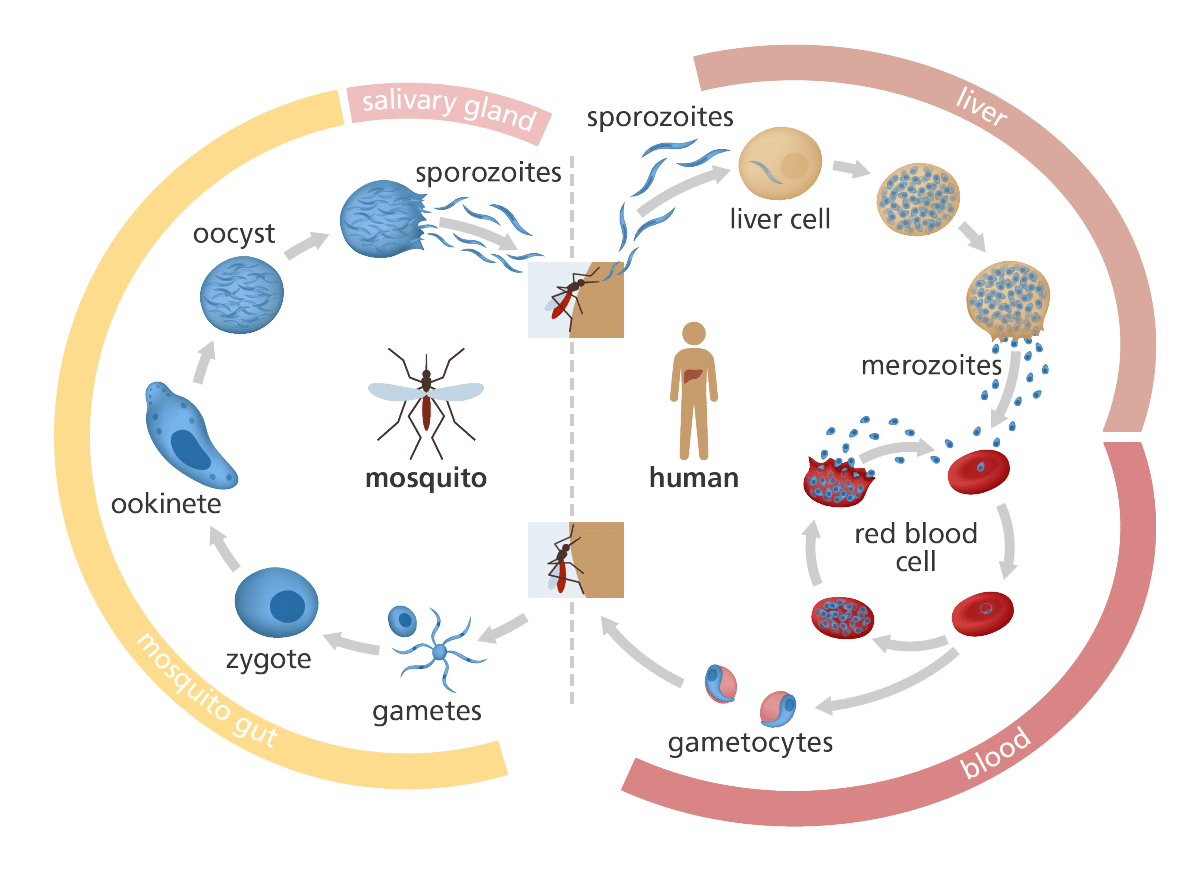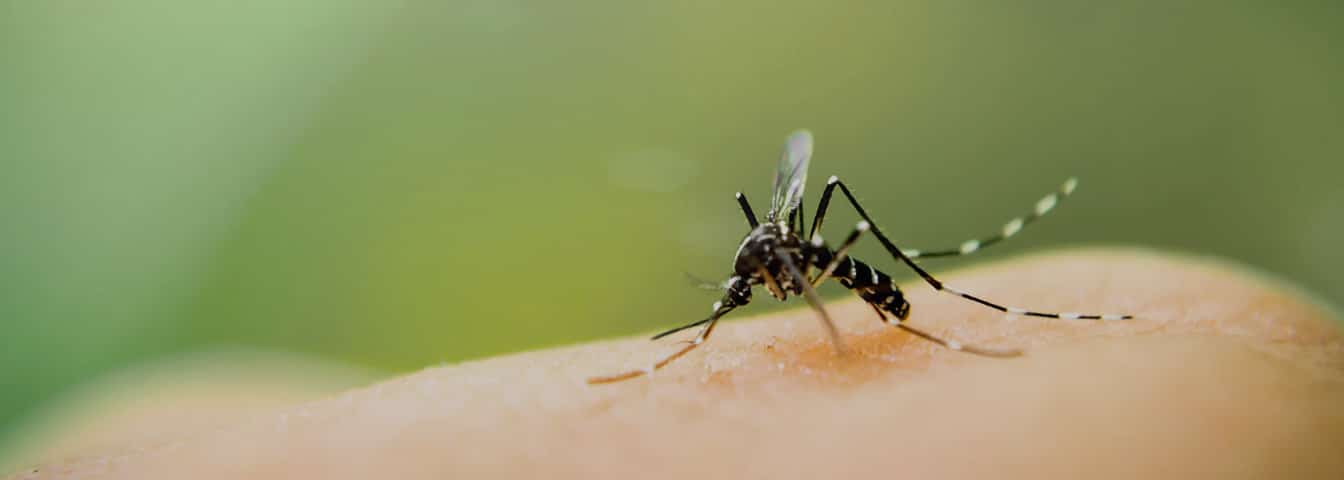What is malaria?
Malaria is often quoted as the most common disease in all human history. With the earliest recorded cases are estimated to have been around 10,000 years ago, when a small plasmodium parasite made a jump across species, assisted by a mosquito bite. These microscopic plasmodium parasites are responsible for causing the disease malaria. Initially, malaria symptoms are very similar to flu symptoms, including a fever, chills and aches. However the most serious cases of malaria can prove to be fatal, and early intervention is very important.
Origins & Causes of malaria
Malaria, unlike other diseases we have talked about, cannot be spread by coughs and sneezes. Malaria transmission can only occur when a person is bitten by a malaria mosquito. Malaria mosquitoes are typically found in tropical regions, with most cases occurring in Africa and Asia. Malaria is not found in the UK, but if you are visiting tropical countries you should check with your GP about the risk of catching malaria.
There are 5 different kinds of plasmodium known to cause malaria, each one causing a different type of malaria. These include:
- Plasmodium falciparum
- Plasmodium vivax
- Plasmodium ovale
- Plasmodium malariae
- Plasmodium knowlesi
Different areas have more common plasmodium in circulation. Plasmodium falciparum is the most common variant worldwide and is common in Africa, it is also the most dangerous type of malaria. Other kinds of plasmodium typically cause less dangerous variations of malaria but does not mean they should be taken lightly as some can remain dormant for a long time inside the body, some up to 3 years after the initial mosquito bite.
Life cycle of malaria
Malaria has an interesting life cycle that works symbiotically within humans and mosquitoes. The plasmodium are parasites that utilise the facilities within humans to replicate themselves. We know that mosquitoes that carry the plasmodium must bite a human to begin their life cycle. Once bitten the plasmodium parasites move toward the liver where they replicate within the cells and cause some to burst. After the liver cells have burst, they release a mass of parasites into the bloodstream where they work their way into red blood cells, where they can be sucked up again by mosquitoes. In the mosquitoes the parasites reproduce again and are then ready to be spread to a greater number of people.

https://www.yourgenome.org/facts/what-is-malaria
Symptoms of malaria
It takes time for the malaria parasites to travel around the body and replicate to the stage where signs of malaria can be seen. As such symptoms typically appear between 7 and 18 days after the initial bite. Signs of malaria include:
- A high fever of 38C or above,
- Feeling hot and shivering,
- Headaches,
- Vomiting,
- Muscle pain,
- Diarrhoea.
While these signs are very similar to other diseases, it is very important to get checked for malaria if you have been to an area where malaria is prevalent. There is a very simple blood test that can show the presence of malaria within a day.
One key feature that is somewhat unique to some types of malaria is a 48-hour cycle of symptoms. During these cycles, patients may go from feeling cold with shivers to feeling developing a high fever with sweats and fatigue. These symptoms will typically last 6 to 12 hours.
Complications of malaria
While the initial signs of malaria are not as serious as they may seem, malaria can quickly turn serious if not treated quickly and the complications can prove fatal. Some of the more serious complications include cerebral malaria and severe anemia.
Cerebral malaria
Cerebral malaria is when the small blood vessels surrounding the brain become damaged, this can lead to seizures and coma.
Severe Anemia
Severe anemia is when the red blood cells in the blood are unable to carry enough oxygen around the body.
Further complications
- liver failure and jaundice – yellowing of the skin and whites of the eyes
- shock – a sudden drop in blood pressure
- pulmonary oedema – a build-up of fluid in the lungs
- abnormally low blood sugar – hypoglycaemia
- kidney failure
- swelling and rupturing of the spleen
- dehydration
Preventing malaria
The good news is that malaria is quite preventable if the right precautions are taken. There is a useful acronym for the approach to preventing malaria, which is the ABCD approach.
Awareness of risk- check information about the area you are in and know if you are at risk of catching malaria.
Bite prevention- wear long sleeves and cover your legs while out during the day, alternatively use insect repellent and sleep under a mosquito net.
Check if you should take malaria prevention medication- your GP can help you find the right medication to take. Be sure to take the correct dose and finish the course!
Diagnosis- if you suspect you have malaria symptoms seek medical advice as soon as possible. Even if it has been a year since returning from travel.
Treating malaria
There are some malaria medications available if you are infected with malaria. These can also act as anti-malarial drugs in some cases such as if you are travelling to a remote location with no access to medical care.
Malaria vaccines
Recently progress has been made in the production of a malaria vaccine. The worlds only malaria vaccine was approved in October 2021. The work is promising and looks to be able to prevent malaria infections from the most dangerous variant of malaria, from Plasmodium falciparum. The vaccination requires four injections and while efficacy rates a relatively low at the present this represents a new way to stop malaria in its tracks.
Malaria clinical trials
Work on a malaria vaccine is continuing with the help of many brave volunteers. In the meantime, other anti-malaria drugs and vaccines continue to be produced and researched at places like FluCamp. Malaria human challenge studies work on affecting the plasmodium parasites before the symptoms have a chance to take hold. If you would like to be a hero and take part in a clinical trial, either a malarial, asthma or flu trial, consider applying to FluCamp!


